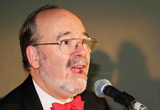 This week we are in Edinburgh, performing on the Festival Fringe. We’ve been doing this intermittently since 1974, and in fact the personal view that I wrote about our first show was my first-ever article in a medical journal (BMJ 1974;4:766). I’ve just re-read it. It’s a weird experience to meet yourself again after 38 years, and slightly disappointing to discover how little you’ve changed.
This week we are in Edinburgh, performing on the Festival Fringe. We’ve been doing this intermittently since 1974, and in fact the personal view that I wrote about our first show was my first-ever article in a medical journal (BMJ 1974;4:766). I’ve just re-read it. It’s a weird experience to meet yourself again after 38 years, and slightly disappointing to discover how little you’ve changed.
But my, how the Fringe has grown. In 1974 we faced competition from “over 100 other attractions,” which seems very small-town in retrospect. This year the Fringe Guide has over 300 pages, each of which has up to a dozen shows. When we started out, we called ourselves “Abracadabarets” to be near the top of the alphabetical listings. Today there are three groups called “Aaaaargh!” and the one with most “a”s comes first. There must be a limit to this formula, surely.
Shows are classified by genre, and comedy takes up 144 pages. Tastes in humour have changed over the years. In the 1970s the mainstay of the Fringe was student revue, with sketches and songs poking gentle fun at authority figures. It was very hit-or-miss, and the fun for fringegoers and critics was to spot the students (like John Cleese and Rowan Atkinson) who were likely to make it big.
Today, top comedy professionals hone their acts before coming to Edinburgh and grabbing the headlines, but there are still plenty of unknowns. The UK’s thriving stand-up industry is churning out award-winning observational comics by the score, with routines about unhappy childhood, the pain of bereavement and the misery of new motherhood. What’s not to like?
People of my age tend to give this a miss. It’s hard to impress them with off-beat insights: they’ve done a lot of observing of their own over the years. They still like music, though, and reminisce fondly about the songs of Tom Lehrer and his English counterparts, Flanders and Swan—the heroes of my youth who inspire us to keep going.
Our show, “The Fabulous Chopin Boys,” is classified under musicals and opera. This puts us into competition with Elton John and Stephen Sondheim (not to mention “Bereavement: the Musical”) but that’s OK. My three musician colleagues—Walter, Viktor, and Sophie—are a match for them. Walter and I have been collaborating since we were housemen, when I used to write leaning on his piano. Now we sit in separate cities, melding his tunes and my lyrics until we can’t remember which came first.
The show tells the story of Chopin’s visit to Edinburgh in 1848, Europe’s year of revolutions. Chopin’s music will be played by Viktor, who looks rather young and healthy to impersonate a composer dying of tuberculosis. Sophie, too, is less than half the age of the Scots lady who sponsored his visit. No matter: at the end of the show we reveal Chopin as the grand-daddy of Edinburgh rock and roll, so some suspension of disbelief will be needed.
Competing interests: The author is one half of Abracadabarets, and their show will almost cover its expenses if it sells out.
James Drife is emeritus professor of obstetrics and gynaecology at the University of Leeds. He is a former vice-president of the Royal College of Obstetricians and Gynaecologists and is currently editor in chief of the European Journal of Obstetrics, Gynecology, and Reproductive Biology.
